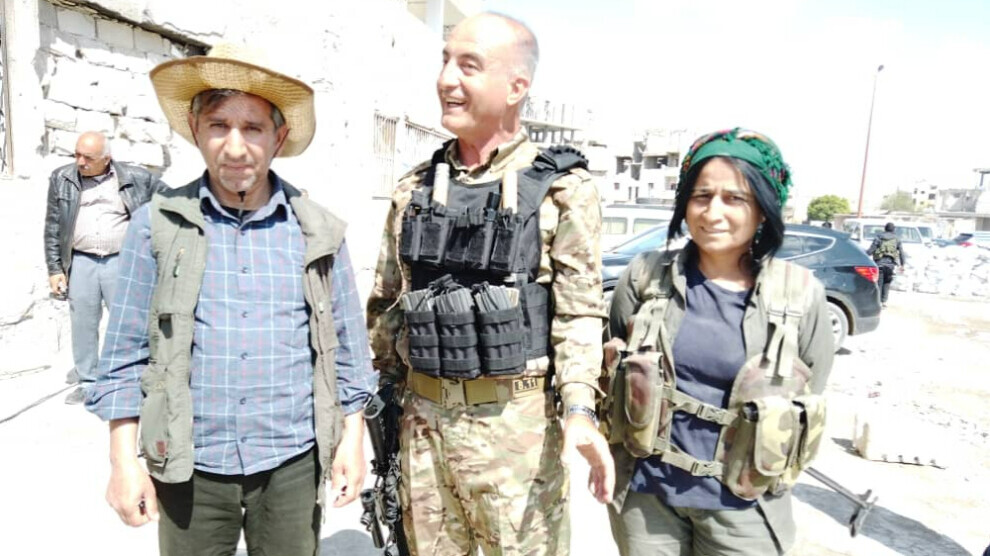The reality of the Kurdish people is distorted through TV series and movies. The director of the new TV series Tava Sor, Numan Yiğit, said: "Our main goal is to tell the story as it is and tell it to society."
The first episode of Rojava's first television series, "Tava Sor" (Red Sun), consisting of 16 episodes, was broadcast on Stêrk TV on Wednesday evening.
Ehmed Tahir wrote the script for the series which is directed by Teymûr Evdikê, Numan Yiğit and Deştî Rasûl. Each episode is 45 minutes long.
The first 7 episodes have been directed by Teymûr Evdikê and Deştî Rasûl, while Numan Yiğit directed the other 9 episodes. Some 35 actors and 500 extras took part in the series.
The first 7 episodes of the series tell the story of the resistance carried out by the YPS forces in Cizre between 2015-2016. The series addresses issues such as national unity, betrayal, struggle, Kurdish patriotism, the reality of the war in Kurdistan.
The series was shot in the cities of Girkê Legê, Qamishlo and Raqqa, was well as in Derik, in North-East Syria.
Speaking to ANF, director Numan Yiğit said that they wanted to tell the story of the resistance experience of the self-government in Bakur (North Kurdistan) and added: "Mothers were murdered in the middle of the street in Cizre. People were burned in the basements. The world remained a spectator to this massacre. The artists did not raise their voices either. We could not close our eyes to this massacre and the epic resistance of our people.”
The script of the TV series Tava Sor was written by writer and screenwriter Ahmet Tahir in 2018, said Yiğit, adding that Tahir wanted to translate Kurdish stories to cinema as he saw this as his social responsibility.
Stating that Ahmet Tahir laid the foundations for the first TV series to be shot in Rojava, Yiğit said that he also made an important effort in the development of the new Kurdish cinema, and that he led the way in the shooting of the first TV series about North Kurdistan.
A very important author
Director Yiğit reminded that Ahmet Tahir not only wrote screenplays, but also novels and short stories.
Commemorating Tahir, who lost his life due to an illness he experienced during the scriptwriting process, director Yiğit said: “I met him in Maxmur. He wrote novels, stories and poems for many years. He had a dream of intertwining Kurdish literature with Kurdish cinema. He wanted to tell the story of the resistance of the Kurdish people not only through writing, but also through cinema. For this reason, he has given great importance to cinema in recent years. He tried to develop communal filmmaking. He was excited, he had a quest, and his effort was great. Kurdish cinema needed stronger scripts. He wrote the script for the TV series Tava Sor and came to Rojava to shoot it. He was not only the screenwriter of the TV series Tava Sor, but also its biggest worker.”
Yiğit said that the people showed great interest in the TV series they shot in Dêrîk and that they took part in every stage of it voluntarily and continued: “The communes and assemblies were in solidarity throughout the filming process, from acting to producing. It is very valuable to process the stories set in Rojava and North Kurdistan in the cinema. Everyone in the drama team was excited about it.”
Many challenges
Stating that they had some difficulties during the shooting of the TV series, Yiğit shared the following: “There were difficulties in finding professional actors. The reality of the Kurdish people in four parts of Kurdistan has been distorted through TV series and movies. The truth of struggle and resistance in North Kurdistan (Sur and Cizre) and Rojava has been turned upside down. Our main goal is to be able to tell the real story to society.”
The story of the Kurdish people
Emphasizing that the series focused on the story of a Kurdish family during the self-government resistance in Cizre, Yiğit said: “We are telling the reaction of the youth to the state and collaborators after the Cizre massacre. In Tava Sor, we are dealing with the determination of the Kurdish people in the struggle for honour. They didn’t bow nor kneeled for hundreds of years. Kurdish youth are ready for serhildan and resistance against any attack. This stance taken by the Kurdish youth is one of our main themes in the series. Tava Sor is the story of the Kurdish people. In this story, there are women characters who fight for a resistance within the family against oppression and persecution. This is a story of cooperation, betrayal, Kurdish love, those who stay in-between, free women.”
Director Yiğit said that they would never forget the efforts made by Ahmet Tahir and Rojda Bakur, and will keep their memories alive.
Who is Numan Yiğit
Yiğit was born in Adana in 1989 as a child of a family from Amed. He entered Ege University Cinema Department in 2009. Two years later, he was jailed in Izmir Kırıklar Prison. During his 5 years of captivity, he focused on cinema and wrote various screenplays. He thought of prison as a training ground in terms of art and cinema. After his release from prison in 2016, he continued his film studies at the Middle East Cinema Academy in Amed. Then he went to South Kurdistan because of ongoing lawsuits against him. He took an active role in the institutionalization of Sine-Maxmûr in Maxmur. He took part in the crew of the movie Blackberry Season, directed by director Haşim Aydemir. He gave trainings to young people interested in cinema in Maxmur. He shot the short film Pêlava Sor and the documentary Payîzok. After Maxmur, he continues his cinema studies within the Rojava Film Commune in North and East Syria.














